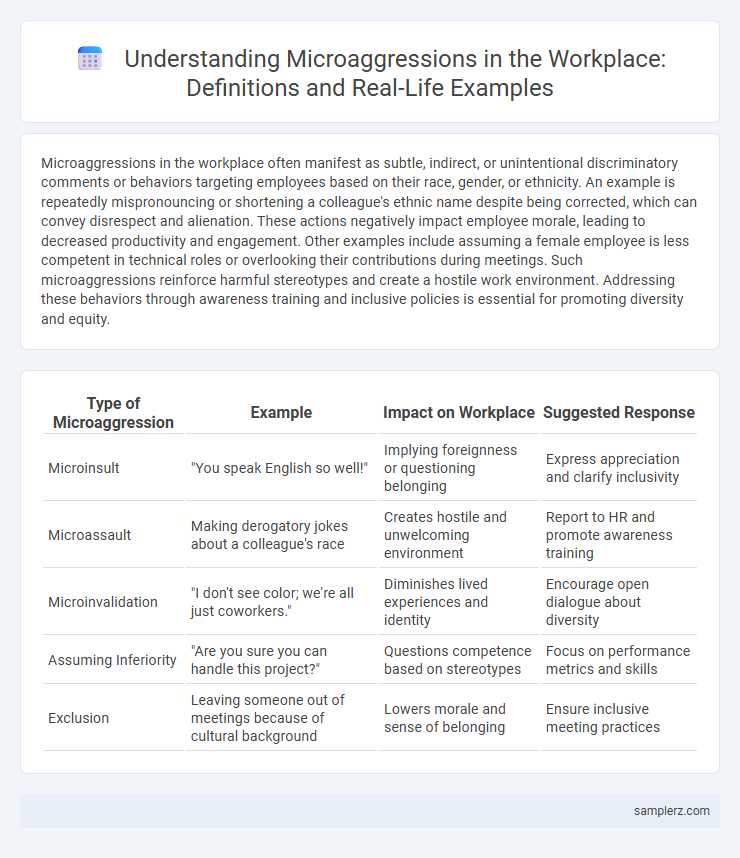Microaggressions in the workplace often manifest as subtle, indirect, or unintentional discriminatory comments or behaviors targeting employees based on their race, gender, or ethnicity. An example is repeatedly mispronouncing or shortening a colleague's ethnic name despite being corrected, which can convey disrespect and alienation. These actions negatively impact employee morale, leading to decreased productivity and engagement. Other examples include assuming a female employee is less competent in technical roles or overlooking their contributions during meetings. Such microaggressions reinforce harmful stereotypes and create a hostile work environment. Addressing these behaviors through awareness training and inclusive policies is essential for promoting diversity and equity.
Table of Comparison
| Type of Microaggression | Example | Impact on Workplace | Suggested Response |
|---|---|---|---|
| Microinsult | "You speak English so well!" | Implying foreignness or questioning belonging | Express appreciation and clarify inclusivity |
| Microassault | Making derogatory jokes about a colleague's race | Creates hostile and unwelcoming environment | Report to HR and promote awareness training |
| Microinvalidation | "I don't see color; we're all just coworkers." | Diminishes lived experiences and identity | Encourage open dialogue about diversity |
| Assuming Inferiority | "Are you sure you can handle this project?" | Questions competence based on stereotypes | Focus on performance metrics and skills |
| Exclusion | Leaving someone out of meetings because of cultural background | Lowers morale and sense of belonging | Ensure inclusive meeting practices |
Subtle Comments That Undermine Colleagues
Subtle comments such as repeatedly mispronouncing a colleague's name or downplaying their contributions during meetings can erode confidence and create a hostile work environment. Remarks like "You're so articulate for someone from your background" subtly imply surprise at competence based on identity, undermining professional respect. These microaggressions diminish inclusion and negatively impact team dynamics by fostering feelings of marginalization.
Interrupting or Talking Over Team Members
Interrupting or talking over team members in the workplace often manifests as a microaggression that undermines collaboration and inclusivity. This behavior disproportionately affects marginalized employees, leading to decreased participation and lower morale. Studies show consistent interruptions can contribute to feelings of invisibility and hinder career advancement for targeted individuals.
Questioning Someone’s Competence Based on Background
Questioning someone's competence based on their background often manifests through subtle comments about their education, ethnicity, or accent, implying they are less capable or qualified. Such microaggressions undermine confidence and create a hostile work environment that hampers productivity and inclusion. Recognizing and addressing these behaviors is essential to fostering a respectful and equitable workplace culture.
Making Assumptions About Roles or Abilities
Assuming a female employee is responsible for administrative tasks without discussing her role exemplifies a microaggression that undermines her professional capabilities. Assigning technical duties exclusively to male colleagues based on gender stereotypes can create a hostile work environment and limit opportunities for women. These assumptions perpetuate bias, reduce workplace diversity, and hinder inclusive collaboration.
Jokes or Remarks About Accent or Language Skills
Jokes or remarks about an employee's accent or language skills often undermine their confidence and perpetuate stereotypes in the workplace. Such microaggressions can create a hostile environment, making individuals feel marginalized or less competent despite their qualifications. Addressing these behaviors with cultural sensitivity training helps foster inclusion and respect among diverse teams.
Overlooking Contributions During Meetings
Overlooking contributions during meetings often manifests as consistently interrupting certain team members or disregarding their ideas without acknowledgment. This microaggression can undermine an individual's confidence and diminish their visibility within the workplace, affecting team dynamics and overall productivity. Recognizing and addressing this behavior promotes inclusivity and ensures that diverse perspectives are valued.
Complimenting in Backhanded Ways
Backhanded compliments in the workplace often mask subtle microaggressions that undermine an employee's confidence and contribute to a hostile environment. Phrases like "You're surprisingly good at this for someone your age" or "I didn't expect you to handle that so well" imply lowered expectations based on stereotypes. These remarks reinforce biases and diminish the recipient's achievements, negatively impacting workplace morale and inclusivity.
Assigning Tasks Based on Stereotypes
Assigning tasks based on stereotypes in the workplace often results in microaggressions that undermine employee potential and reinforce biased assumptions. For instance, consistently delegating technical assignments to men while assigning administrative work to women perpetuates gender stereotypes and limits career growth opportunities. Such behavior diminishes workplace inclusivity and negatively impacts employee morale and productivity.
Excluding Employees From Informal Networks
Excluding employees from informal networks in the workplace often manifests as consistently leaving certain individuals out of lunch groups, after-work gatherings, or casual decision-making conversations. This form of microaggression undermines team cohesion and can result in reduced access to crucial information, career opportunities, and social support. Research indicates that exclusion from informal networks disproportionately impacts minority employees, exacerbating feelings of isolation and hindering professional advancement.
Unequal Recognition or Praise Based on Identity
Unequal recognition or praise in the workplace often manifests when employees receive different levels of acknowledgment for similar achievements due to their gender, race, or ethnicity, creating disparities in professional advancement. Studies show that women and minority employees frequently experience overlooked contributions compared to their white male counterparts, impacting morale and career growth. Organizations that fail to address these biases risk fostering a work environment with reduced inclusivity and employee engagement.

example of microaggression in workplace Infographic
 samplerz.com
samplerz.com